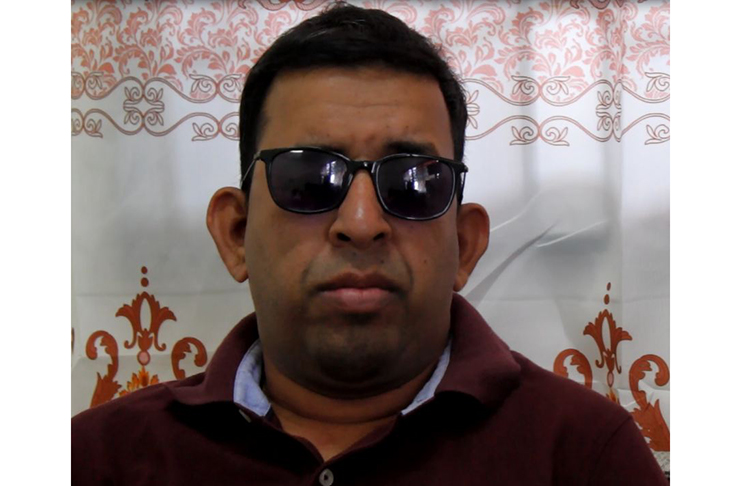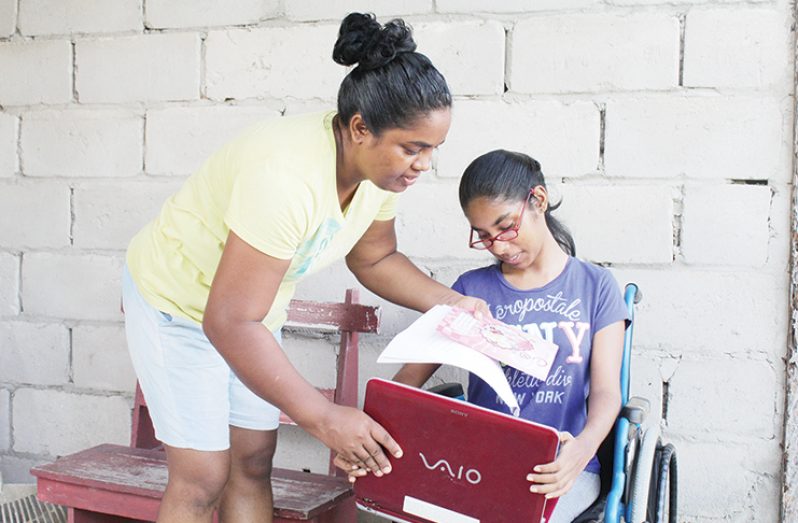…persons with disabilities praise government for budget measures
Members of the community of Persons With Disabilities (PWDs) are thankful that through Budget 2019 wheelchair users will have greater access to vehicles tailored to their needs.
In Guyana, a large proportion of our urban and rural transport systems remain inaccessible to persons with disabilities– a constraint that is a serious impediment to disability-inclusive development; but in the 2019 budget estimates, Finance Minister Winston Jordan announced that provisions have been made to cater for exemption from excise duty and Value Added Tax (VAT) on vehicles for use by PWDs.
The National Commission on Disability (NCD) Chairperson Evelyn Hamilton, believes that the proposed tax concession for the vehicles specially equipped for transporting PWDs is a step in the right direction. “Anything that helps Persons With Disabilities in whatever small way it does is a positive step forward. It may not be everything we expect, but every little bit helps,” she said.

Hamilton added: “A lot of persons who are wheelchair users have difficulties getting public transport to accept them, particularly if you don’t have a collapsible wheel chair. It’s very difficult because you have to manoeuvre the chair in and it probably takes up more space than a normal person would. So, persons with disabilities, particularly those with physical disabilities find getting public transport to be extremely difficult. So, for those who can, it would be a big difference to them.”
The NCD chairperson explained that change which would put PWDs in a better financial position to afford such vehicles is not only about the money to be saved, but the mental aspect of each individual.
“It gives them a sense of independence; it empowers them beyond the saving of the money. [For that person it means] I don’t have to wait on somebody to carry me somewhere, I can go myself. I can do this myself,” she said.
Hamilton is happy that the provision also coincides with the theme of the upcoming 2018 International Day of Persons with Disabilities to be observed in December: “Empowering persons with disabilities and ensuring inclusiveness and equality”.
Jordan told the House: “In order to avoid abuse, the exemptions would be granted after the commission representing persons with disabilities certifies that the person, the vehicle and the handset are eligible for the concessions. These two initiatives solidify government’s commitment to equity and inclusion for all its citizens through the use of ICT.”
ACCESS TO PUBLIC TRANSPORTATION

Eight years ago Uttamkumar Isurdeen, a former cricketer, received injuries to his spinal cord during an accident which has since rendered him a wheelchair user. One of his main problems, as Hamilton outlined, is the fact that he cannot utilise public transportation easily and must traverse by a chartered car which costs him some 16,000 each month.
Upon hearing of the provisions for persons like himself in the budget, Isurdeen told the newspaper, he was filled with hope for even greater things that can be accomplished in the future. “Using transportation is very costly on me, so that move about duty-free concessions for vehicles for persons with disabilities is a good move. I compliment the government for that,” he said.
He has his eyes set on a vehicle, purchasable from the United States, which includes adjustments for the brakes and other functions just for wheelchair users.
He said: “That will be easier. That move by the government where they thought about persons with disabilities –as we want an equal life—that is a good breakthrough.” Isurdeen’s disability has not hindered him from remaining a huge cricket fan as he told the newspaper that he still goes to every CPL cricket game along with his family and friends.
“I go all the CPL matches so I have to make sure I budget for that. Sometimes I can’t buy any meals [there] because to go to the cricket I have to make sure I have transportation available for me, my wife and friend,” he said. A part from being a sport enthusiast, Isurdeen is a youth volunteer at President Youth Award Republic of Guyana (PYARG) and a role model to youths with disabilities.
With a vehicle tailored to his needs, he stated that he would be able to better travel to the places he goes to exercise; to take part in races; to be involved in workshops and more.
“It’s a beginning now; we need more concessions, but it’s the beginning and the main thing is that we got recognised,” he highlighted. The 2019 Budget has also made provision for the government to examine the feasibility of granting a tax rebate on handsets with accessibility features for PWDs.
This will allow Guyanese who are visually- and hearing impaired to afford a smartphone. However, Isurdeen also hopes that this aspect can be extended to all PWDs, as saving finances wherever he can makes for a surety of better days ahead.
This newspaper had reportedly recently on 18-year-old Rajni Persaud, a first-year student of the University of Guyana pursuing a Diploma in Accountancy. She said easy access to transportation and even public buildings is key, having been diagnosed with cerebral palsy when she was six months old. Her mother, Usha Persaud, told the Guyana Chronicle that transportation is “a big issue” adding, that she had decided not to send her daughter to secondary school due to the high cost of transportation.
The family resides at Coldingen on the East Coast of Demerara. “When she wrote Common Entrance I didn’t decide to send her to school back…I used to walk from here (Coldingen) pushing her in a wheelchair from here to meet Enterprise Primary School, everyday…When the rain falls then we take a taxi,” Usha related.
However, with motivation from others, Usha said she allowed her daughter to attend secondary school, even though this came at a cost of $5000 per week for a taxi to take Rajni to school. But it paid off as Rajni graduated from President’s College in 2017 with eight Grade Ones and three Grade Twos. Determined to give her daughter a fair chance of attending university- Usha and her husband Khanai agreed to foot the hefty taxi bill. “It’s really expensive, to be honest for a week its $18,000 I pay now for UG. When she used to go President’s College I used to pay $5000 a week, every week,” said the mother, who has given up working to facilitate the movements of her daughter.
In an effort to facilitate persons with disabilities, particularly those in wheel- chairs, Usha recommends that each Local Authority Area (LAA) be equipped with a special bus to accommodate this population, noting that there are many more persons who would like to be engaged in society but feel that their needs are not accommodated.
Ganesh Singh, a commissioner on the National Commission for Disability, expressed similar views, recommending that “the government reinstate some form of transportation system that is operated by the state,” which can accommodate persons with disabilities. “It’s one of the hindrances why you have a lot of wheelchair users not being more visible because it is costly for them to come out their homes,” Singh, who is visually impaired, stated.



.jpg)









